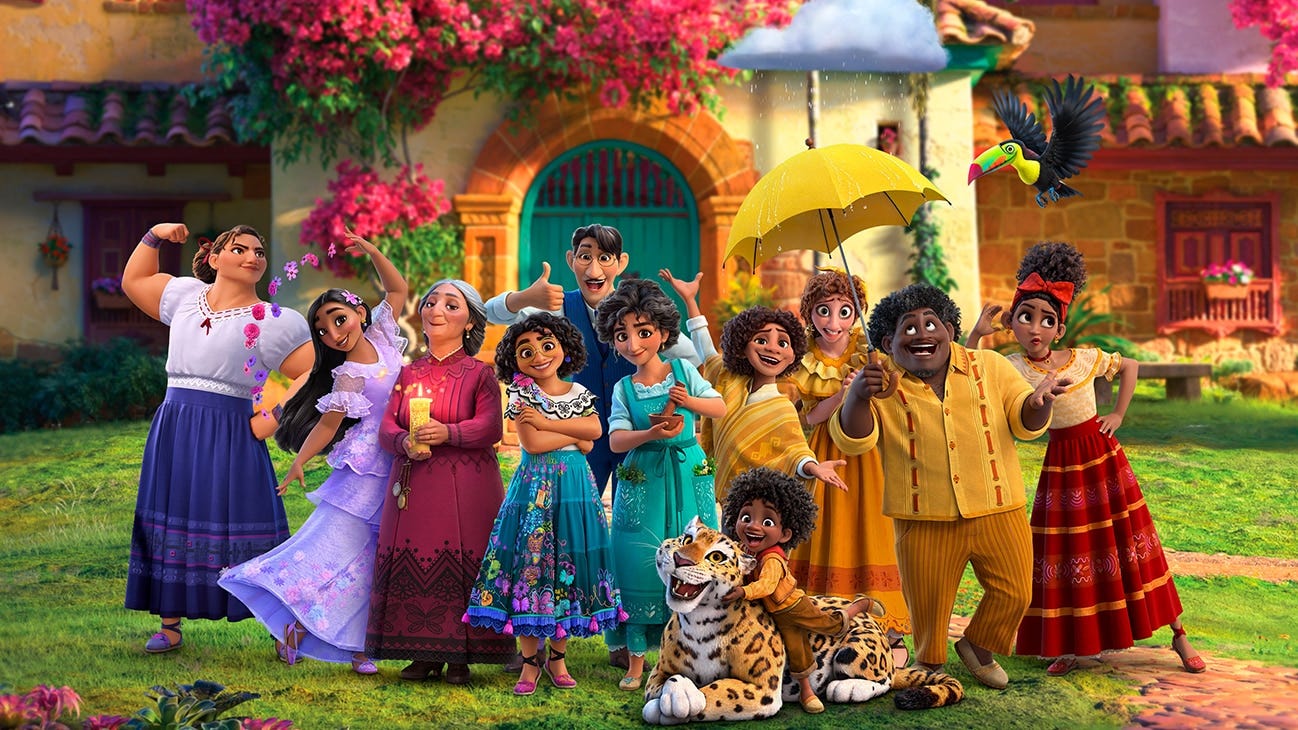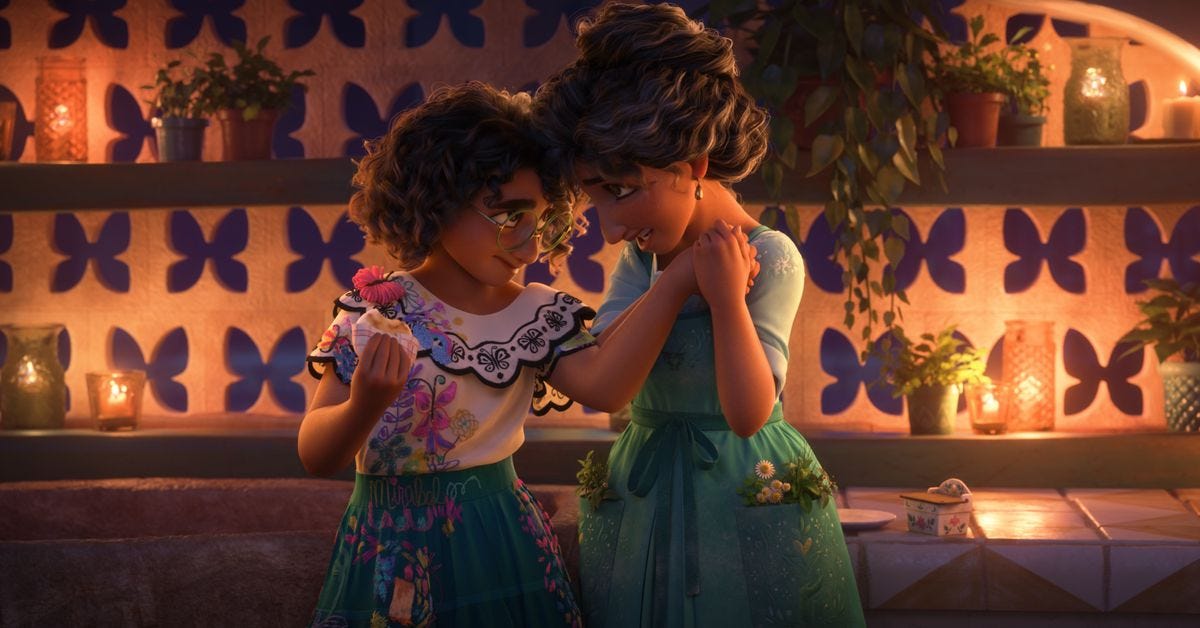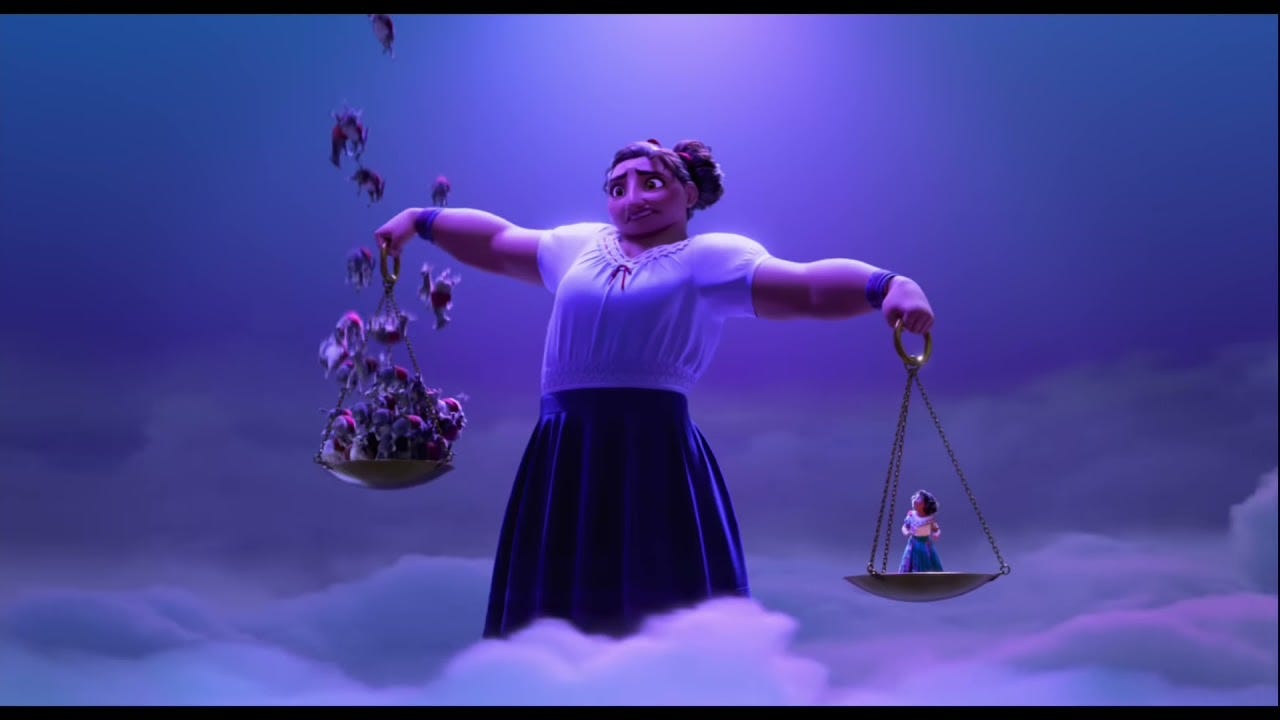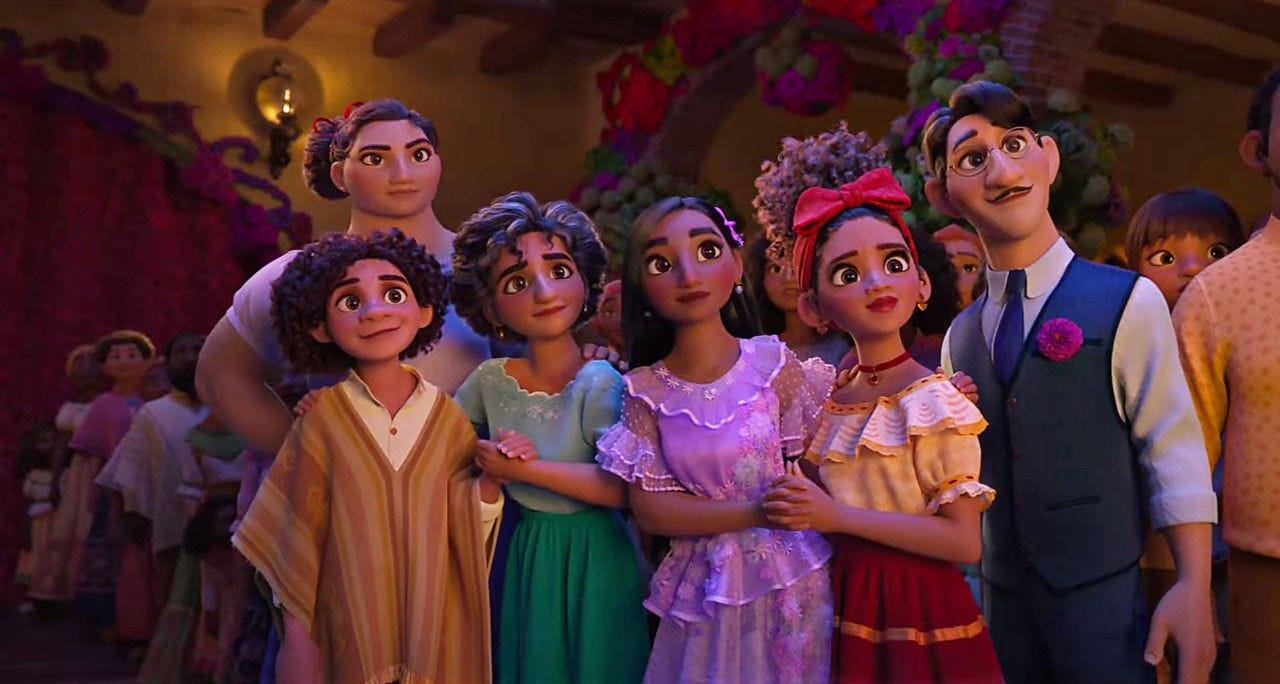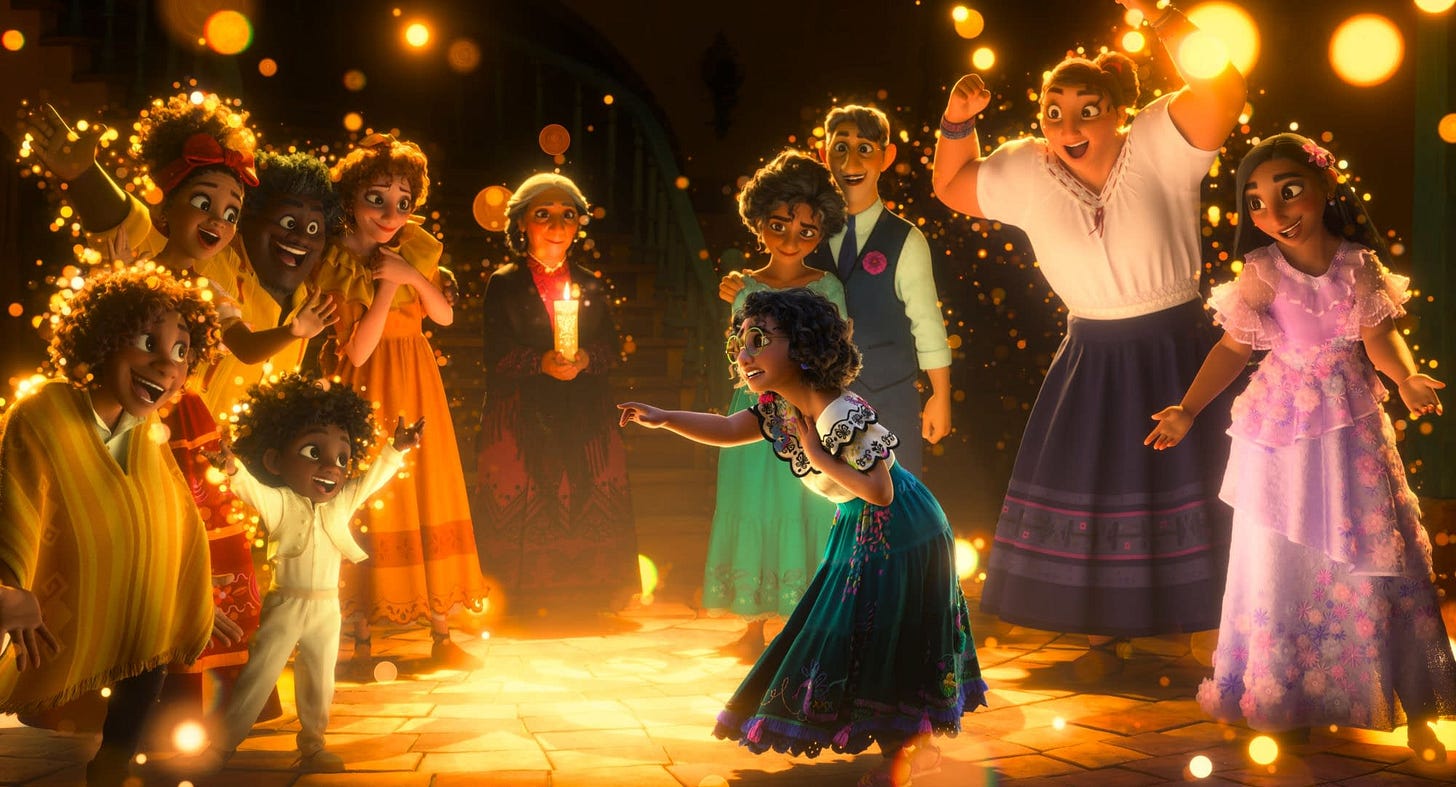Encanto: Challenging Harmful Traditions in a Not-So-Memorable Musical
A look into the filmmaking aspects and the feminist message of Encanto
This review contains two parts:
A general review that talks about the plot, technical and filmmaking aspects. A feminist review that talks about how the movie treats its female characters.
Hope you enjoy! 💗
Encanto - General Review:
Plot:
Encanto is the story of the Madrigal family whose matriarch (abuela Alma) has kept the magic of their house (Casita) alive for years by carefully raising her children, grandchildren while strictly adhering to traditions.
When a child of Madrigal family comes of age, they attend a ceremony where the magic Candle that keeps the house alive blesses them with a magical ability along with their own magical room (like the tent at Quidditch World Cup in Harry Potter, except this one has a whole little world inside).
The only child who hasn't been blessed with a gift is Mirabel Madrigal. Ever since her disastrous ceremony, Mirabel has felt incomplete, alone, and has always been kept aside by her abuela for the fear that she might bring more ruin to the magic.
On the night of little Antonio's ceremony, Mirabel sees the walls of Casita cracking and the Candle’s light faltering. But when she brings everyone out of Antonio's room to show them, the cracks disappear. From hereon, the mystery slowly unravels as to what is happening to Casita and the magic of family Madrigal, and who is responsible for this destruction.
Credit where it's due:
As with every movie, Disney nails the accuracy in its depiction of a culture and its people. There were comments on the internet about how Columbian families found so much relatability with the story, the costumes, and character designs. You can read some of the comments here.
Stephanie Beatriz renders beautiful voice acting as Mirabel that was cute and memorable in its own way.
Inspiring Encanto:
The problem:
Where the movie falls flat, however, is with its script and its cinematography which made even the important scenes forgettable.
Script:
It felt like the characters were rushed into dialogues and actions just to fit the plot rather than their reactions seeming natural or typical of who they are. Every character was just boiled down to an annoying puppet who’s out to get Mirabel. The only character out of the entire family that seemed to empathize with Mirabel, (other than her own parents) was little Antonio. As a result, I ended up not liking the family at all.
When the end did come and the characters did change, the change was so sudden. It wasn't a natural process where they took time to talk and slowly grow. One moment, they felt stuck, and the other, they weren't. One moment, they were cold, and the other they were empathizing. Character changes seemed like a one-way mood swing that was predictable from the start, and not a heartfelt journey.
Cinematography:
I don’t think I felt much emotions when the characters expressed their feelings or when they were involved in what should’ve been amazing action sequences. For instance, when Mirabel navigated her way through the ruins of Bruno’s room or was escaping the falling sands, it was as if the filmmakers were trying to get to the point rather than being in the moment.
Rather than trying to make sense of a character’s decision, or spending time to dwell in an emotion, the movie surged forward from one sequence to the next.
In a crucial scene in abuela’s past where she is fleeing along with her husband and three children from conquerors, the action feels flat. This scene is rooted in real tragic history and the people who know about its past feel heartbreak while watching it. But as a viewer who sees the film without this knowledge, the film doesn’t do much to make us fear for their safety.
While they are fleeing along with the rest of their townspeople, they seem to be at a safe distance from the horsemen. But instead of just running away, abuela’s husband leaves her to go stand in front of the horsemen only to get struck down. Abuela doesn’t hold him back, her husband doesn’t fight—there was no real struggle to make the scene feel real and emotional. It felt like a filler for the story rather than an important scene that brings a magical candle alive to build a protective home for Alma and her children.
It was as if they forgot to add the little quirks that make up an animated film—exaggerated character actions and dynamic camera movements. It was like watching a play in a theater.
Another thing the film could’ve used more was close-ups. It might seem like a weirdly specific detail to criticize, but close-ups can do a lot to a scene. They can add drama and tension. They can entice the viewers with details and help the audience enjoy the film more. I don’t remember Encanto using much close-ups in its scenes.
One place where the movie really shines with good cinematography is when Luisa sings “Surface Pressure”. I really expected the movie to be as good as this song, but unfortunately, it wasn't.
In the end, the only thing memorable was Luisa's struggle to keep up with the pressures of being strong but internally feeling weak and inadequate. I did not feel this connection even with Mirabel, whom I spent the entire movie with.
Feminist Review:
Character design:
Starting with the appearance, the female characters of family Madrigal were all given different body types, hair types, and skin tones. It was an accurate depiction of how diverse the appearance of people in a culture can be.
It was also an interesting choice that the movie gave super-strength (a conventionally masculine power) to a female character. It was such a refreshing decision and a smart one, because super strength here did not just stop with being a physical entity, but the female audience could relate to her problems of having to carry the burdens and pressures of a family. They could relate to the pressure of having to be a responsible adult in their youth and teenage years as the eldest daughter. Giving Luisa this power along with her song was a brilliant choice overall.
Challenging harmful traditions:
The movie also shows how older women like abuela Alma trying to please the society by asking the girl children to uphold traditions, achieve perfection, and carry the weight of family's honour on their shoulders is a problematic thing that needs to stop.
Unlike in Brave, where Merida saves the day by accepting to love her mother who forced her into tradition, in Encanto, Mirabel brings down the entire house by confronting abuela and pointing out her unjust behaviour. As a result, the perfect Isabela who has always dressed in pink, created pretty flowers, and accepted to marry a man abuela chose, ditches it all to embrace what she can make of her magic and herself if she lets go of the need for perfection.
Abuela, the conservative woman in every family who strives for her family to appear perfect in the eyes of the society,—she too accepts her mistakes, and apologizes for it.
The message:
Encanto is an important film that forces traditional families to see what they're doing wrong. In this story, the character that tradition deems a troublesome woman, is the one that pulls together a family that is breaking apart and restores the love and magic of their home.




